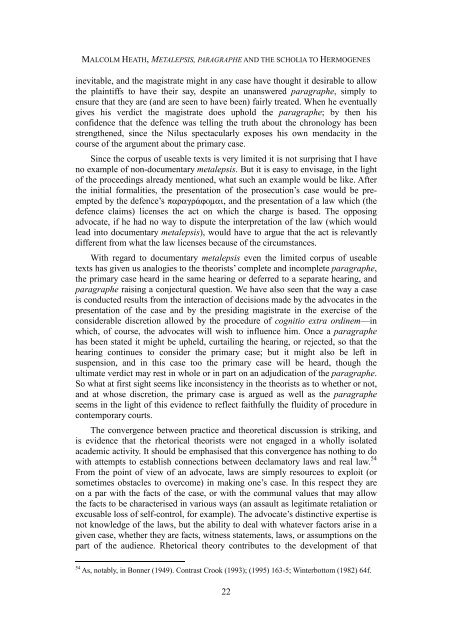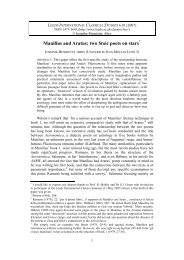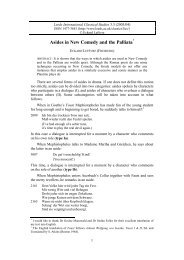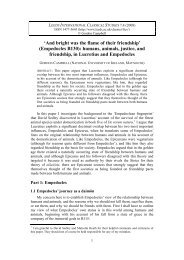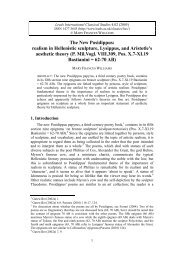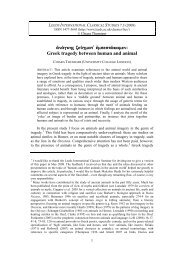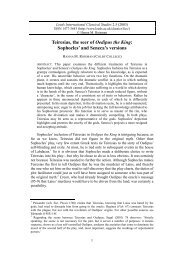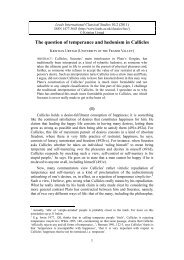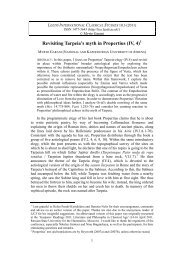Metalepsis, paragraphe and the scholia to Hermogenes - Leeds ...
Metalepsis, paragraphe and the scholia to Hermogenes - Leeds ...
Metalepsis, paragraphe and the scholia to Hermogenes - Leeds ...
Create successful ePaper yourself
Turn your PDF publications into a flip-book with our unique Google optimized e-Paper software.
MALCOLM HEATH, METALEPSIS, PARAGRAPHE AND THE SCHOLIA TO HERMOGENES<br />
inevitable, <strong>and</strong> <strong>the</strong> magistrate might in any case have thought it desirable <strong>to</strong> allow<br />
<strong>the</strong> plaintiffs <strong>to</strong> have <strong>the</strong>ir say, despite an unanswered <strong>paragraphe</strong>, simply <strong>to</strong><br />
ensure that <strong>the</strong>y are (<strong>and</strong> are seen <strong>to</strong> have been) fairly treated. When he eventually<br />
gives his verdict <strong>the</strong> magistrate does uphold <strong>the</strong> <strong>paragraphe</strong>; by <strong>the</strong>n his<br />
confidence that <strong>the</strong> defence was telling <strong>the</strong> truth about <strong>the</strong> chronology has been<br />
streng<strong>the</strong>ned, since <strong>the</strong> Nilus spectacularly exposes his own mendacity in <strong>the</strong><br />
course of <strong>the</strong> argument about <strong>the</strong> primary case.<br />
Since <strong>the</strong> corpus of useable texts is very limited it is not surprising that I have<br />
no example of non-documentary metalepsis. But it is easy <strong>to</strong> envisage, in <strong>the</strong> light<br />
of <strong>the</strong> proceedings already mentioned, what such an example would be like. After<br />
<strong>the</strong> initial formalities, <strong>the</strong> presentation of <strong>the</strong> prosecution’s case would be preempted<br />
by <strong>the</strong> defence’s paragr£fomai, <strong>and</strong> <strong>the</strong> presentation of a law which (<strong>the</strong><br />
defence claims) licenses <strong>the</strong> act on which <strong>the</strong> charge is based. The opposing<br />
advocate, if he had no way <strong>to</strong> dispute <strong>the</strong> interpretation of <strong>the</strong> law (which would<br />
lead in<strong>to</strong> documentary metalepsis), would have <strong>to</strong> argue that <strong>the</strong> act is relevantly<br />
different from what <strong>the</strong> law licenses because of <strong>the</strong> circumstances.<br />
With regard <strong>to</strong> documentary metalepsis even <strong>the</strong> limited corpus of useable<br />
texts has given us analogies <strong>to</strong> <strong>the</strong> <strong>the</strong>orists’ complete <strong>and</strong> incomplete <strong>paragraphe</strong>,<br />
<strong>the</strong> primary case heard in <strong>the</strong> same hearing or deferred <strong>to</strong> a separate hearing, <strong>and</strong><br />
<strong>paragraphe</strong> raising a conjectural question. We have also seen that <strong>the</strong> way a case<br />
is conducted results from <strong>the</strong> interaction of decisions made by <strong>the</strong> advocates in <strong>the</strong><br />
presentation of <strong>the</strong> case <strong>and</strong> by <strong>the</strong> presiding magistrate in <strong>the</strong> exercise of <strong>the</strong><br />
considerable discretion allowed by <strong>the</strong> procedure of cognitio extra ordinem—in<br />
which, of course, <strong>the</strong> advocates will wish <strong>to</strong> influence him. Once a <strong>paragraphe</strong><br />
has been stated it might be upheld, curtailing <strong>the</strong> hearing, or rejected, so that <strong>the</strong><br />
hearing continues <strong>to</strong> consider <strong>the</strong> primary case; but it might also be left in<br />
suspension, <strong>and</strong> in this case <strong>to</strong>o <strong>the</strong> primary case will be heard, though <strong>the</strong><br />
ultimate verdict may rest in whole or in part on an adjudication of <strong>the</strong> <strong>paragraphe</strong>.<br />
So what at first sight seems like inconsistency in <strong>the</strong> <strong>the</strong>orists as <strong>to</strong> whe<strong>the</strong>r or not,<br />
<strong>and</strong> at whose discretion, <strong>the</strong> primary case is argued as well as <strong>the</strong> <strong>paragraphe</strong><br />
seems in <strong>the</strong> light of this evidence <strong>to</strong> reflect faithfully <strong>the</strong> fluidity of procedure in<br />
contemporary courts.<br />
The convergence between practice <strong>and</strong> <strong>the</strong>oretical discussion is striking, <strong>and</strong><br />
is evidence that <strong>the</strong> rhe<strong>to</strong>rical <strong>the</strong>orists were not engaged in a wholly isolated<br />
academic activity. It should be emphasised that this convergence has nothing <strong>to</strong> do<br />
with attempts <strong>to</strong> establish connections between declama<strong>to</strong>ry laws <strong>and</strong> real law. 54<br />
From <strong>the</strong> point of view of an advocate, laws are simply resources <strong>to</strong> exploit (or<br />
sometimes obstacles <strong>to</strong> overcome) in making one’s case. In this respect <strong>the</strong>y are<br />
on a par with <strong>the</strong> facts of <strong>the</strong> case, or with <strong>the</strong> communal values that may allow<br />
<strong>the</strong> facts <strong>to</strong> be characterised in various ways (an assault as legitimate retaliation or<br />
excusable loss of self-control, for example). The advocate’s distinctive expertise is<br />
not knowledge of <strong>the</strong> laws, but <strong>the</strong> ability <strong>to</strong> deal with whatever fac<strong>to</strong>rs arise in a<br />
given case, whe<strong>the</strong>r <strong>the</strong>y are facts, witness statements, laws, or assumptions on <strong>the</strong><br />
part of <strong>the</strong> audience. Rhe<strong>to</strong>rical <strong>the</strong>ory contributes <strong>to</strong> <strong>the</strong> development of that<br />
54 As, notably, in Bonner (1949). Contrast Crook (1993); (1995) 163-5; Winterbot<strong>to</strong>m (1982) 64f.<br />
22


